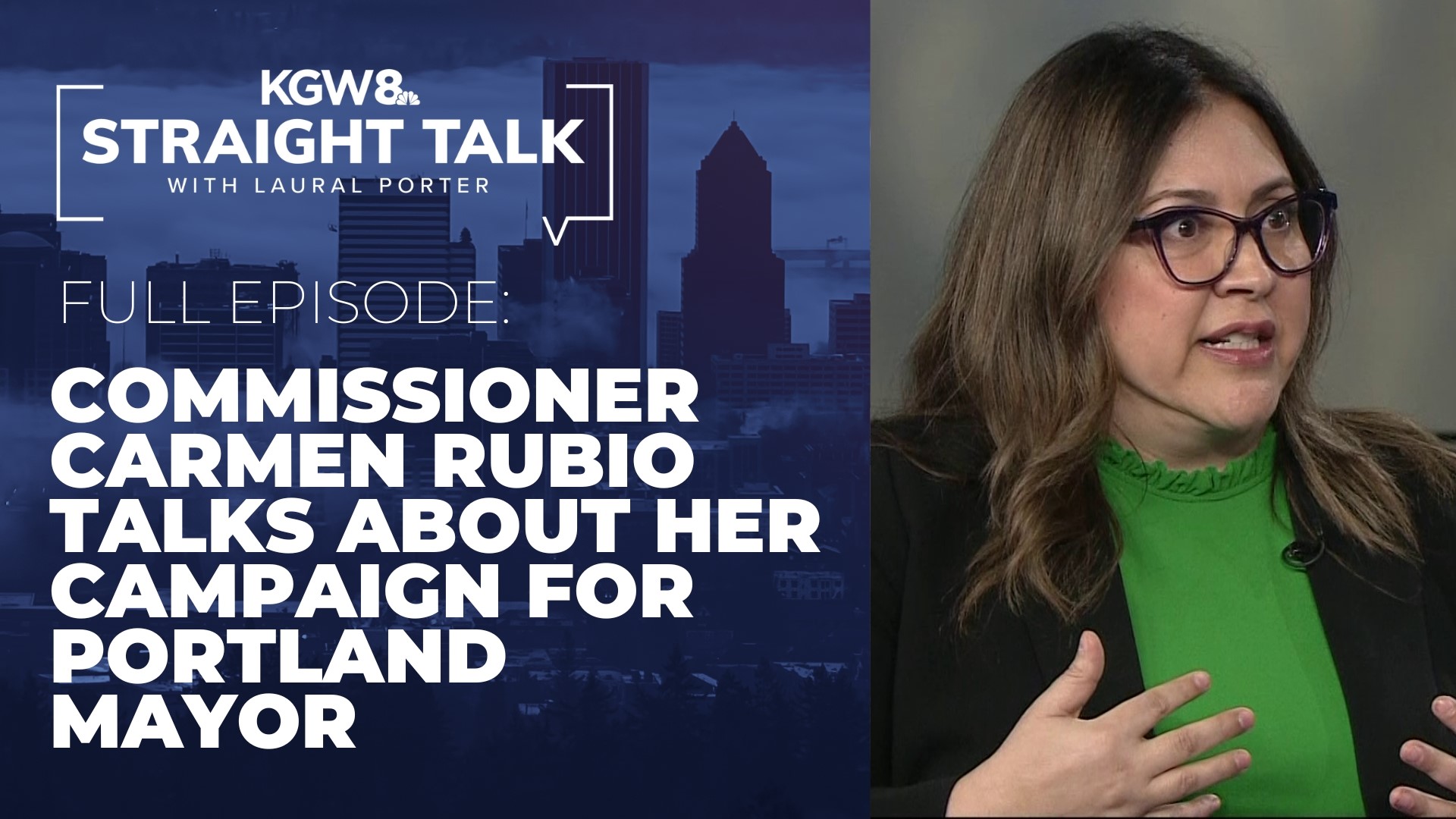PORTLAND, Ore. — Coming this November, Portlanders will face many decisions on the ballot, including picking the city’s next city mayor. Whoever wins will become the first mayor under Portland's new system of government starting in January 2025.
So far, there are three leading candidates in terms of money raised, and they're all current Portland City Commissioners: Rene Gonzalez, Mingus Mapps and Carmen Rubio.
Rubio was a guest on this week’s episode of “Straight Talk” to discuss how she plans to tackle Portland’s homeless crisis, public safety and climate crisis.
"We are in a very consequential time, we're coming out of a challenging few years of COVID," Rubio said. "The landscape is different and everybody wants to feel safe and have access to their city. And what we do right now in this next set of years, especially on the cusp of a new government transition coming in — and a new change — and a new form will set the tone for the next generation."
Rubio is the first Latina to be on the Portland City Council. Currently, she oversees the community and economic development services areas of Portland, which includes the Portland Housing Bureau, Bureau of Development Services, Bureau of Planning and Sustainability and Prosper Portland.
If elected as Portland's mayor, Rubio would the fourth woman to hold the office.
Balancing needs
In Portland's new system of government, the mayor will no longer sit on the city council, and instead help oversee day-to-day city operations. A city administrator appointed by the mayor and confirmed by city council will handle hiring, firing, and supervising bureau directors.
Rubio said in this new mayoral function she hopes to put Portland's vision back on track for future generations.
"We have been really focusing on a lot of urgent and short-term needs — rightly so," she said. "There's so much going on. There's a lot of crises in our streets and in our communities, and now is the time that we need to look forward and move through these urgent situations."
Tackling crises
If elected mayor, Rubio said her number one priority would be dealing with the crises on Portland's streets, like housing and homelessness. The issue is what first drew her to run Portland City Council.
"Housing is a human right and it all starts with people feeling stable and accessing human services and basic needs," she said. "For me, that means that making sure that we have a system in place to move people through and actually get them into stable housing long-term."
To do this, Rubio said it won't involve banning tents or tarps — a reaction to fellow mayoral candidate Gonzalez's sit-down interview with KGW, where he stated that if elected, he will continue directing Portland Street Response to stop handing out tents.
"When we're talking about ending homelessness and real solutions, tent bans is not solving a broken system," Rubio said. "We need to solve the broken system... So, I'm going to focus on real solution and not temporary things that make us feel better — maybe for a minute — but doesn't actually solve the problem."
While, Rubio said that she does want to see changes in the Joint Office of Homeless Services between the city and the county, she does not want any services to be halted while figuring it out.
"We have to be moving forward," she said.
Crime and public safety
Under Portland's new government system, the mayor will be in charge of hiring the next Portland police chief. While mayoral candidates Gonzalez and Mapps are known to take a more "law and order" position on policies, Rubio said her position will be centered on ensuring the livability of Portland communities through a compassionate, yet strong public safety system.
Asked about the possible ballot initiative that would modify the city's police oversight system that voters approved in 2020, Rubio said she would like to see the system fully implemented as originally approved by voters before any changes are made.
Additionally, she will look to make the Portland Street Response system more accessible citywide while increasing its program components.
Rubio initially supported the approval of Measure 110, but in the recent legislative session pushed for the rollback of the decriminalization portion.
"We want to address the substance abuse issues, but we also want safety in our streets," Rubio said. "We also want to do it with compassion. These are the things that Portlanders care about. I don't think anybody at the time anticipated — myself included — the landscape around and the availability of new drugs on the streets."
The problem is worsened by an ongoing lack of treatment options, she added.
Climate crisis
Currently, Rubio oversees Portland's Clean Energy Fund, which through tax revenue will receive an unanticipated $1.3 billion over the next five years.
With the unexpected funds, Rubio said she's looking looking to expand who the program can give the funds to, including private companies, schools and municipalities.
"It really provides us an opportunity to do larger scale investments that really address (greenhouse) gasses and really make an impact in the community," Rubio said.
She added that she wants to focus on the projects and investments that will bring the greatest return for Portland.
Straight Talk airs Saturday and Sunday at 6:30 p.m. and Monday at 7 p.m. Straight Talk is also available as a podcast.

